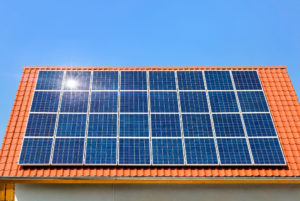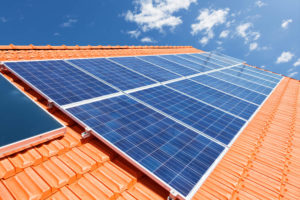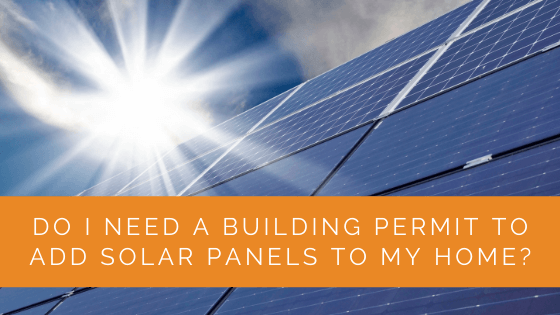Embarking on the journey of adding solar panels to your home can be an exciting step towards sustainable living, but navigating the legal and regulatory landscape first is essential. Understanding whether you need a building permit for this addition is not just a bureaucratic formality; it’s a crucial aspect of ensuring your installation’s safety, efficiency, and compliance. This article delves into the complexities of solar permitting requirements, offering insights into why these regulations exist and how they vary across different regions. From the nuances of building codes and compliance agreements to the involvement of local inspectors and the types of permits required, we cover the essential information to help you make informed decisions and smoothly transition to solar energy.
Contents
- 1 Key Takeaways
- 2 Why are There Solar Permitting Requirements?
- 3 Do You Need an Electrical Inspector While Installing Solar Panels?
- 4 Types of Permits for Solar Panel Installation
- 5 Factors Considered While Choosing Building Permits
- 6 Solar Panel Permit Requirement in America
- 7 The Approval Window of Such a Permit
- 8 FAQs
- 9 Case Study: Navigating Solar Panel Permitting
- 10 Expert Insights From Our Solar Panel Installers About Needing a Building Permit to Add Solar Panels to Your Home
- 11 Experience Solar Excellence with Us!
- 12 The Bottom Line
Key Takeaways
- You need a permit to install solar panels on your home, and you should contact your local government and power company to apply for the necessary permits.
- Solar panel permits are required to ensure compliance with safety standards, building codes, and local regulations, and they help guarantee the safe installation of solar systems.
- There are different types of permits for solar panel installation, including electrical permits, building permits, and solar photovoltaic permits, each serving a specific purpose in the installation process. The approval time for permits varies depending on your location and the type of permit required.
Why are There Solar Permitting Requirements?
You will need a solar panel permit because of the enforced law by each state government in America. You need to follow varying statutes, building codes, and compliance agreements. Moreover, such regulations are there to help streamline the solar installation process of any photovoltaic power company.
Once these regulations are met, the building permits will get approval and solidify your building’s safety.
The primary intention of such permits while building a solar array is to invoke responsibility. The solar contractor must follow all the safety standards and abide by obligations. Ideally, solar panel permits ensure the installation process will get handled with care.
It also considers essential enforcements like federal, local, and state safety regulations.
Do You Need an Electrical Inspector While Installing Solar Panels?
Your roof-mounted installation has to go through a stringent permitting process. The solar energy system you want to install must adhere to the safety standards and local building codes.
Indeed, solar installations are not straightforward and almost always require insight from a local electrical inspector. They will give you data about the building’s electrical codes and its worthiness of handling solar panels.
The inspector will walk you through the solar panel system, analyze it with the building department and relay the data to your utility company. The local government will help you obtain permits to install a solar panel array based on this information.
Fun Fact: The local fire departments might come in to analyze your home and give you a clearance area for the array in case of a fire.

Types of Permits for Solar Panel Installation
Before installing a solar system, you need to gain permission from your local government. For example, you might need a permit from the local historical commission if you live in a historical state. However, the majority of the permit requirements root in the building codes, location, zonal information, and structural engineering.
For that, you need to contact the building department and analyze how much power your solar panels will produce.
Based on this information, they will decide whether or not your solar installation meets the local utility regulations. Either way, the inspectors will expect you to file any of the following three permit applications based on the respective codes.
- Electrical Permit – It is the necessary permit required when you want to connect your array with the grid. This permit ensures that the grid interconnections and wiring are perfect.
- Building Permit – This permit is the green light given by your local government to integrate solar panels into your home. It is a document that includes everything about the project requirements and local safety compliance.
- Solar Photovoltaic Permit – This permit considers the size, type, and location of installation of the panels. You get the permission needed to build the solar system you want through this.
Once you comply with the regulations, there will be an inspection that will determine the state of your permit application.
Factors Considered While Choosing Building Permits
Every solar panel permit can differ based on the neighborhood you are in.
Your property is unique, and the permit requirements will vary accordingly. Therefore, it might be hard to gain the permits if you fail to analyze the basics. Various factors influence the permit type you need.
Indeed, the required permits you get will vary by the solar energy system’s location, size, and type. Here is a brief about the basics.
By Location
Every state, town, a neighborhood in America will have different solar requirements. Your permits will need to adhere to building codes, zoning laws, and more based on municipal and state principles. Besides, you might need HOA permission to install your solar panels.
In simple words? Your location will determine your permit status and type. Hence, you need to adhere to all the standards put forward by the local governing body in your area.
By System Type and Size
You will need more permits to install large ground-mounted panels for commercial use. For this, you might need a land-use review. Whereas you only need a building or electrical permit to install an off-grid solar panel on your roof.
Even the structural standard requirements will vary depending on the size and type of your panels. Furthermore, the approval cycle will also be more extensive for a larger photovoltaic system as it feeds on more energy and needs additional safety regulations.
Again, in simple words? The more demanding your panels are, the more prominent the paperwork.
Solar Panel Permit Requirement in America
The entire process will be different in Florida as compared to California. It means that every neighborhood has a varied permit requirement.
The things you should get in order before applying for a permit are the complete construction work plans of:
- Roof
- Electrical
- Elevation
- Location
During the filing process, you should submit all the construction plans for your building. Parallel to these data, you should also adhere to inspection requirements like:
- Initial Inspection: This process will check your building’s wiring and roof structure for a roof-top array. On the other hand, inspectors will check the soil base through soil engineering processes for a ground array.
- Final Inspection: Once the panels have been built, the last call will be. Once you have passed this, the government will approve your array with the inspector and ensure you acquire a smart meter to measure the power usage.
Note: You Should always be well-versed with government regulation and solar energy knowledge to enhance the rate of the permitting decision.
The Approval Window of Such a Permit
Typically, the entire permit process will take up to a few weeks. Yet, you can expect to get approval within days depending on your location and requirement type. There are certain “solar-friendly states” where the approval rate remains unparalleled. (Lucky you, if you live in those!)
So, the average time combined with the application process, submission, inspection, and approval revolve around a few days to a few weeks.
Indeed, getting a permit for your solar panels can get expensive and time-consuming.

FAQs
Do you have to get permission to install solar panels?
Yes, you will need a permit to install solar panels irrespective of your locality. To install fully functional photovoltaic panels, you will require building and electrical permits. However, severe consequences can occur if you fail to abide by the laws.
Do you need building regulations approval for solar panels?
All solar system installations should go through the building department and adhere to the regulations. Installing panels from a licensed electrician falls under home improvement and need approval. Hence, get the proper building regulations approvals before reaching out to a solar contractor.
Can you put solar panels in an existing house?
The proposed solar equipment you use in your home will power your existing house and take you off the grid. All you need is authentic and properly licensed construction work. This way, you no longer need to rely on the grid or utility companies for electrical power.
What happens when you cannot get the permission required?
After the final inspections, your building will not have clearance to mount solar panels when you fail to acquire the necessary permits. Irrespective of whether you want a ground-mounted array for commercial or a roof-mounted one for your home, failure to comply with the standards can get costly.
Background
The Barnes family, residing in Portland, Maine, decided to reduce their carbon footprint by installing solar panels on their home. Excited about the potential energy savings and environmental benefits, they soon realized the complexity of the permitting process required for their solar project.
Project Planning and Objectives
The primary goals for the Barnes family included:
- Ensuring the solar panel installation complied with local building codes and regulations.
- Navigating the permitting process smoothly to avoid delays.
- Achieving a successful installation that would provide reliable, renewable energy for their home.
To achieve these objectives, the Barnes family enlisted the help of Solar Panels Network USA, which is known for its expertise in solar installations and navigating local permitting processes.
Implementation
Initial Consultation and Planning
Solar Panels Network USA began with a thorough site evaluation and consultation. The team explained the importance of securing the necessary permits and outlined the steps involved. They emphasized the need for both building and electrical permits, considering Portland’s specific regulations.
Permit Application Process
The Solar Panels Network USA team handled the entire permitting process on behalf of the Barnes family. This included:
- Submit detailed plans for the proposed solar installation to the Portland building department.
- Coordinating with local utility companies to ensure grid compatibility and compliance.
- Scheduling and managing inspections as required by local authorities.
Engagement with Local Authorities
Portland’s local authorities required a comprehensive review of the Barnes’ property to ensure it could support the solar installation. This involved:
- A structural assessment of the roof is needed to verify it can handle the weight and configuration of the solar panels.
- Electrical inspections to ensure the system would integrate safely with the existing grid infrastructure.
Installation and Final Inspection
Once the permits were secured, the installation proceeded without any delays. The Solar Panels Network USA team installed the solar panels, ensuring they met all the requirements stipulated in the permits. After installation, local authorities conducted a final inspection to confirm everything was up to code.
Results and Benefits
Compliance and Safety:
- The Barnes’ solar installation met all local building codes and safety standards.
- The thorough permitting process ensured that the system was both reliable and efficient.
Cost and Time Efficiency:
- By entrusting the permitting process to experienced professionals, the Barnes family avoided potential pitfalls and delays.
- The project was completed on schedule, allowing the family to start benefiting from solar energy sooner.
Environmental and Financial Impact:
- The Barnes family significantly reduced their electricity bills by harnessing solar power.
- They have contributed to Portland’s sustainability goals by reducing its reliance on non-renewable energy sources.
Summary
The Barnes family’s experience in Portland, Maine, highlights the importance of understanding and navigating the permitting process for solar panel installations. By partnering with Solar Panels Network USA, they ensured their project met all local regulations, proceeded smoothly, and provided both environmental and financial benefits. This case study underscores the value of working with knowledgeable solar installers who can handle the complexities of permitting, allowing homeowners to enjoy the benefits of solar energy without unnecessary hassle.
Expert Insights From Our Solar Panel Installers About Needing a Building Permit to Add Solar Panels to Your Home
Understanding local regulations is crucial when planning a solar panel installation. Each municipality has specific requirements, and getting the right permits ensures your system is safe and compliant.
Permits are not just bureaucratic hurdles; they protect homeowners by ensuring that installations meet all safety standards and building codes. This prevents issues down the line and ensures the system operates efficiently.
Working with experienced solar installers who are familiar with the permitting process can save you time and hassle. We handle the paperwork and inspections, ensuring your project moves smoothly from start to finish.
Experience Solar Excellence with Us!
Trust in Solar Panels Network USA, where our seasoned experts deliver top-quality solar solutions for homes and businesses nationwide. With a legacy of countless successful installations and a commitment to sustainable energy, we’re your reliable partner in the solar journey. Ready for a brighter, eco-friendly future? Call us now at (855) 427-0058 and harness the power of the sun!
The Bottom Line
Gone are the days of simply going down to City Hall and getting approvals through forms. Irrespective of the solar system design, you will need a permit from the same town you live in.
You could talk to your property owner and schedule an initial inspection. After that, they will ask you to consult the local municipality to know zoning laws and other legislation to help you acquire a permit. Your application will be for electrical, building, or solar photovoltaic permits.
Each of them serves a different purpose but will help you abide by local codes and install solar panels in your building. The entire process usually takes a few days to weeks before getting approved.
Such permits will regulate the installation process and ensure optimal safety while running solar electricity. However, if you cannot clear these standards, you might incur a fine. You should re-check your electrical outlets inspect the roof to ensure everything is structurally sound.
Now, you are fully equipped to scan through permitting requirements that vary by both your state and locality.
Tip: Even if you have solar photovoltaic systems installed, you should re-check the required solar permits. The regulations may have changed, and your solar panel plans should comply with the rules.
About the Author
Solar Panels Network USA stands at the forefront of solar energy solutions, driven by a team of seasoned solar engineers and energy consultants. With over decades of experience in delivering high-quality solar installations and maintenance, we are committed to promoting sustainable energy through customer-centric, tailored solutions. Our articles reflect this commitment, crafted collaboratively by experts to provide accurate, up-to-date insights into solar technology, ensuring our readers are well-informed and empowered in their solar energy decisions.

